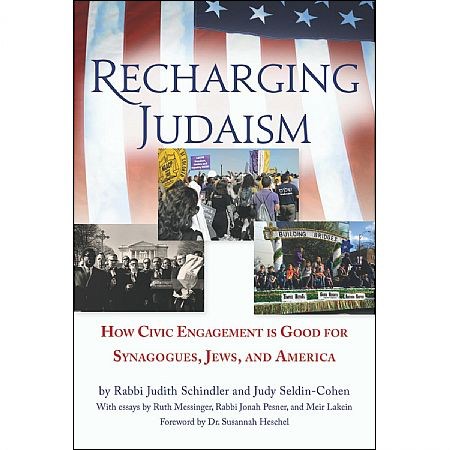Recharging Judaism: Strengthening Synagogues through Civic Engagement
Each morning we face the news of the evening before. I often pick up my smartphone with dread. Who will be cast into fear and despair today? The undocumented student fearing deportation? The person victimized by racial bias in policing? The person made homeless by the most recent storm? There are days when I feel emotionally sapped before finishing my coffee.
When Elie Wiesel (z”l) visited Charlotte in 2007, he met with twenty local religious leaders in a lengthy, powerful exchange. He discussed with us our responsibilities to counter the injustices that we see. One pastor asked him, “How can we respond to the enormity of the world’s problems?” And he said to the assembled clergy, “All of you, because of who you are, know how to use words.”
I continually strive to fulfill Wiesel’s charge. As rabbis, we know how to use words – to craft classes, sermons, and editorials, and to speak from podiums across our cities. That is a critical first step to responding to the issues of our day. But it is not enough.
To ensure the values that we teach inside our synagogues are lived outside its walls, we need to work not harder, but smarter. And as we do –- as we partner with our congregants engaging them fully in this work — we recharge our synagogues, we strengthen our congregants’ Jewish identity, and we engage meaningfully in democracy.
Recharging Judaism states the case for how civic engagement can recharge the synagogue. As we extend our congregational work into our communities by addressing systemic issues and unjust policies, we create “minyans on the move” where Jewish friendships, community and memories are nurtured. I value the friendships I created long ago travelling to Albany with Westchester Reform Temple’s sisterhood to argue against a harsh Welfare Reform Bill and the relationships nurtured from a caravan of congregants driving with me to Raleigh for Moral Monday protests.
Recharging Judaism also demonstrates how civic engagement can strengthen Jewish identity. While theology and mitzvot are not always hot topics for conversation, the issues of our day certainly are. Actualizing our prayers by working for justice creates a Judaism of meaning and relevance for my congregants — and for me. My father and grandfather lived their Judaism fighting for the marginalized and oppressed. With their words and work, they saved lives and created greater justice, equity, equality, and peace.
Lastly, Recharging Judaism: How Civic Engagement Is Good for Synagogues, Jews, and America, offers a path for becoming engaged with democracy as Jewish institutions. We need that now more than ever. Democracy is fragile and requires our voices and vision.
From the moment I was named Senior Rabbi of Temple Beth El in Charlotte, North Carolina in 2003, I had a clear goal of expanding my congregation’s mission to include social justice. I was not alone. Rabbis and congregations across our country have been doing the same. Through more than 50 interviews, my gifted co-author Judy Seldin-Cohen and I bring to you the wisdom that clergy and lay leaders in congregations large and small spanning the country have gleaned from their work. We learn from their successes, their failures, their models for congregational engagement, the ways in which they garnered support from their Board and lay leadership, and from how they sustained and evolved their work.
Like the study of Torah, successful civic engagement requires continual learning. Like the cycles of Torah, civic engagement is not linear. Issues arise and issues subside. There are always new politicians, new political realities, and new partners with whom we can work.
The words of academic Michael Walzer, lifted up in our liturgy, ring true: “…wherever you live, it is probably Egypt; …there is a better place, a world more attractive, a promised land; …the way to the land is through the wilderness. There is no way to get from here to there except by joining together and marching.”
Each morning, I sense we are in a wilderness. But during the day, when I stand with others drawing strength from their wisdom and experience, I know we are moving forward. As Rabbis, collaborating with our congregants, with our interfaith community partners, and with others across our country, we can indeed bring our nation closer to being a place of promise for us and for so many who have been left behind for far too long.



No Comments